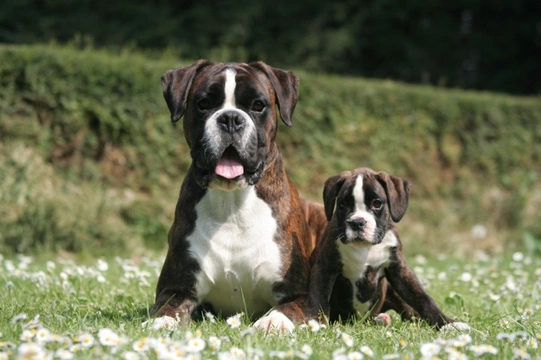
Ten things you need to know about the boxer dog before you buy one
The boxer dog is currently (as of July 2019) the UK’s 31st most popular dog breed according to Pets4Homes statistics, and one that most of us know well. They’ve been popular in the UK for many decades and have a broad and wide-reaching appeal with a wide variety of different types of owners, being equally at home in both urban and rural environments.
Boxers were one of the dog breeds that used to have their tails docked as standard, and whist today this is thankfully illegal, the sight of a boxer with a full, long tail is still quite odd to many of us! The breed got their name due to their tendency to box with their front paws, and this, coupled with their grumpy-looking faces, can make them appear quite comical.
If you are considering buying a boxer dog, this isn’t a decision to rush into lightly, and you need to do lots of research before you commit to sharing your home with a dog of this type. With this in mind, this article will tell you ten things you need to know about the boxer dog breed – before you go ahead and pick a puppy. Read on to learn more.
They’re quite expensive to buy
Boxers are one of the more expensive dog breeds to buy, with the average asking price for pedigree puppies of the breed being around the £1,100 mark, and even non-pedigrees changing hands for not far under £1,000 on average.
When it comes to the cost to keep boxers, as a large breed they can be quite costly to care for too, which you should factor into your decision before you make a purchase.
Boxers are brachycephalic
Boxers have a shorter than normal muzzle and soft palate, and often, prominent or protruding eyes. This trait is known as being brachycephalic, and whilst it is more moderate in the boxer breed as a whole than it is in many other dog breeds, can come with an increased risk of health problems.
Brachycephalic dogs may overheat more easily or struggle when exercising, as well as being prone to snoring. Their prominent eyes are also more vulnerable to accidental damage too.
They’re not hugely long lived
Large dog breeds don’t tend to live for as long on average as smaller ones, and the boxer falls towards the slightly low side of the spectrum even for large breeds.
The average lifespan of the boxer is between nine and ten years if appropriately cared for and fed a good quality diet, although individual dogs of the breed may of course live for considerably longer.
Boxer coats are low maintenance
Boxer dogs have short, single layered coats, which means that they don’t need very much brushing and grooming and so, are easy to keep in good condition. They shed a moderate amount of fur, but as this fur is short, it doesn’t cause too much mess within the home.
They need a lot of exercise
Boxers are rangy, energetic and fun loving and as such, they need plenty of exercise to keep them fit and healthy, and to allow them to burn off their excess energy.
At least a couple of hours of energetic exercise every day is really required to ensure that the dog is fit, happy and calm within the home, which should include plenty of chances to socialise with other dogs.
Boxers are at the lower end of the intelligence spectrum
The boxer is ranked in 90th place out of a total number of 138 different dog breeds in the Coren ranking of canine intelligence, which places them in the group reserved for dogs of average working intelligence.
This means that boxers may need up to 40 repetitions to learn a new command, and are only likely to follow it first time around 50% of the time!
…But they are excellent watchdogs
One area in which the boxer excels, however, is as a watchdog – they are naturally protective and territorial, and will patrol their home and garden and be on the lookout for threats or intruders.
They will bark to alert you of someone’s approach, but they must be trained and managed carefully to ensure that they do not become overly enthusiastic about seeing people off!
Boxers are very loyal and loving
The boxer breed is one that forms strong bonds with their owners, and they are very loyal in this regard, trusting their handler above all other things. They are also very affectionate and loving with the people that they know and trust, and very sweet natured to have around.
They don’t like being left alone for too long at a time
Boxers are quite sensitive, soulful dogs and they will not thrive if left alone for long periods of time. Whilst boxers can be conditioned to entertain themselves happily for a couple of hours at a time when home alone, they are not a good pick for people that need to leave their dogs alone for the larger part of the day.
They can be a good breed for a first-time dog owner
The prospective boxer owner needs to develop a good understanding of the breed, what makes them tick, their likes and dislikes and how to properly manage and handle them, but there is no reason that with this in mind they cannot be a good dog for a first-time owner.
As long as you factor in the breed’s need for plenty of exercise, appropriate training and not being left alone for too long, boxer ownership can be very rewarding, regardless of your background or level of experience with dogs.



